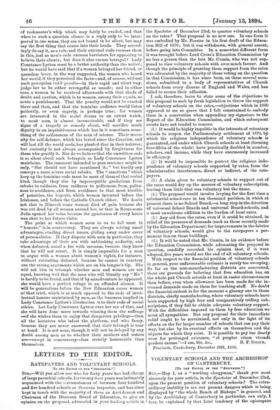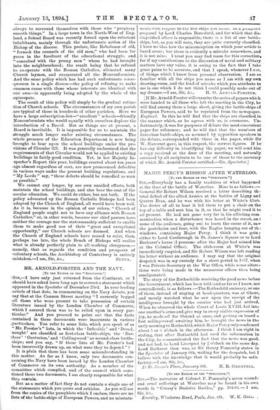VOLUNTARY SCHOOLS AND THE ARCHBISHOP OF CANTERBURY.
[To THE EDITOR OF THE " SPECTATOR."3 SIR,—May I, as a "working clergyman," thank you most sincerely for your article, in the Spectator of December 23rd, upon the present position of voluntary schools ? The extra- ordinary inability to see our present dangers which is being displayed by "the whole Bench of Bishops" in general, and by the Archbishop of Canterbury in particular, can only, I fear, be explained by that fatal tendency of the episcopate
always to surround themselves with those who "prophesy smooth things." In a large town in the North-West of Eng- land, a School Board was recently forced upon the reluctant inhabitants, mainly through the unfortunate action of the Bishop of the diocese. This prelate, like Rehoboam of old, ." forsook the counsels of the old men," who had been for sears in the forefront of the educational struggle, and ." consulted with the young men" whom he had brought into the neighbourhood; the result being that he refused to co-operate with the Roman Catholics, alienated many Church laymen, and exasperated all the Nonconformists. And the same policy which has had such unfortunate conse- luences in a single diocese—the policy of refusing to make ommon cause with those whose interests are identical with our own—is apparently being adopted by the whole of the -episcopate.
The result of this policy will simply be the gradual extinc- tion of Church schools. The circumstances of my own parish are typical of those in hundreds of other parishes. Here we have a large subscription-list—" excellent" schools—friendly Nonconformists who would equally with ourselves deplore the -introduction of a Board. But as things are at present, a Board is inevitable. It is impossible for us to maintain the struggle much longer under existing circumstances. The whole pressure of the Education Department is now being Grought to bear upon the school buildings under the pro- visions of Circular 321. It was generally understood that the requirements of that Circular would not be applied to existing buildings in fairly good condition. Yet, in her Majesty In- spector's Report this year, buildings erected about ten years ago almost regardless of cost, are now pronounced defective in various ways under the present building regulations, and My Lords" say, "these defects should be remedied as soon as possible."
We cannot any longer, by our own unaided efforts, both maintain the school buildings, and also bear the cost of the secular education. We could do either, but not both. If the policy advocated ;ay the Roman Catholic Bishops had been adopted by the Church of England, all would have been well. As it is, because in the opinion of our rulers, "Church of -England people ought not to have any alliance with Roman 'Catholics," or, in other words, because our chief pastors have aaeither the courage nor the statesmanship sufficient to enable them to make good use of their "great and exceptional -opportunity," our Church schools are doomed. And when -the Church of England schools have ceased to exist, then, perhaps too late, the whole Bench of Bishops will realise what is already perfectly plain to all working clergymen,— 'namely, that as regards the condition and prospects of -voluntary schools, the Archbishop of Canterbury is entirely







































 Previous page
Previous page